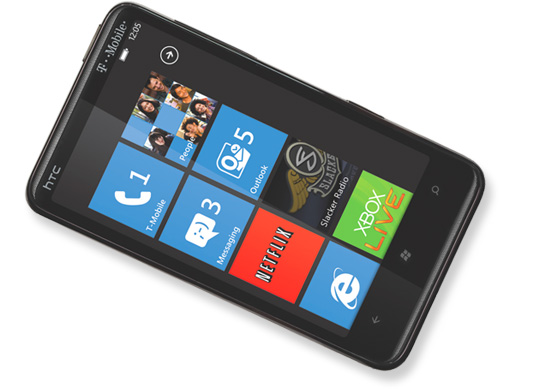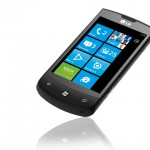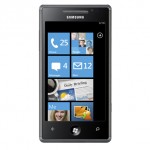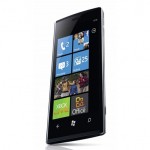
Oh Microsoft. I feel for you. Windows Phone 7 might have been a huge hit. It might have been the true iPhone killer. It might have even become the dominant mobile platform. But it won’t. It’s an iOS, Android and BlackBerry world now and there isn’t room for anyone else.
It’s too bad, really. Windows Phone 7 looks great to me. I believe Microsoft really nailed the overall design philosophy behind it. Windows Phone 7 is about communication, not apps. That’s a key difference and one that I, as a Droid X owner, greatly appreciate and understand. This platform is in a way the Google of mobile OSs in that it wants you to get your information as quickly as possible. Awesome, but it’s still a few years too late.
We all know the back story here. Microsoft sat out of the smartphone revolution and instead made slight tweaks to Windows Mobile while everyone else followed Apple’s lead into an application-focused platform. Smartphones today are pretty bland without 3rd party apps. They’re made that way on purpose. While Apple’s iOS devices and Windows Phone 7 seem to have the same baked-in capabilities, the two present them in a totally different way.
 That’s fine, really. Apple’s strategy works great as it allows the company to release next-gen devices with a load of applications. But it’s still focused on apps where Windows Phone 7 is anything but. In many ways Windows Phone 7 seems like a next-generation BlackBerry and that’s probably by design.
That’s fine, really. Apple’s strategy works great as it allows the company to release next-gen devices with a load of applications. But it’s still focused on apps where Windows Phone 7 is anything but. In many ways Windows Phone 7 seems like a next-generation BlackBerry and that’s probably by design.
BlackBerries have long been the dominant smartphone. They still dominate although the Android horde is quickly overtaking its market share. But RIM’s BlackBerry devices achieved their success not with apps, but with capabilities. Windows Phone 7 aims to do the same.
The whole interface is designed to be as efficient as possible. Message counts and missed phone calls are clearly labeled on the home screen, and the whole thing is user-customizable. It just seems more competent right out of the box. You can’t say that about Android phones. Users spend weeks customizing and finding apps just to gain some sort of usability. Only HTC’s Sense skin provides any sort of usable interface without additional widgets and apps.
 Personally I hate my Android phone. It’s work. I feel like I spend most of my time maintaining it rather than using it. I constantly have to manage apps, pay close attention to the battery life, and I’m always looking to the next Android release to solve my problems — and I’ve only had it since August. I hate that I’m tied down to it for another 18 or so months.
Personally I hate my Android phone. It’s work. I feel like I spend most of my time maintaining it rather than using it. I constantly have to manage apps, pay close attention to the battery life, and I’m always looking to the next Android release to solve my problems — and I’ve only had it since August. I hate that I’m tied down to it for another 18 or so months.
But here lies the problem of Windows Phone 7. It hit the market too late. I would venture to say that most of its target market is already locked into a long-term carrier commitment and unwilling to pay any ETF to jump on board with an unproven device.
The first crop of Windows Phone 7 devices are dropping later this month on AT&T and T-Mobile in the states. Skipping over Verizon is a mistake, but that’s another post. So instead Windows Phone 7 will battle the iPhone on its home turf and also against established low-cost Android and BlackBerry devices. It doesn’t stand a chance in the short-term and therefore probably won’t be able to gain any real long-term traction.
 Android devices are only going to improve, BlackBerry smartphones will likely continue pounding the low-cost crowd and iPhone 5G will stay its profitable course all while capable Windows Phone 7 devices sit all by themselves in the corner previously occupied by their Winmo 6.5 brethren. That’s the future as I see it.
Android devices are only going to improve, BlackBerry smartphones will likely continue pounding the low-cost crowd and iPhone 5G will stay its profitable course all while capable Windows Phone 7 devices sit all by themselves in the corner previously occupied by their Winmo 6.5 brethren. That’s the future as I see it.
Still, there’s a good amount of users out there that seem right for Windows Phone 7 as a good amount of tweens and moms use BlackBerrys just for texting and Facebook. That’s a huge, profitable demographic. Sure, diehard Android fans won’t like the lack of openness and iPhone users will miss the thousands of apps.
Microsoft is hitting the smartphone market too late for Windows Phone 7 to be a breakaway success. The big three smartphone platforms are already too entrenched in consumer’s minds. However, outside of the snobby Internet crowd, Microsoft still has a good name with most people and a solid marketing blitz might help the new platform chip-out a foothold. If Windows Phone 7 hit two years ago, it would be where Android is today. Oh well.